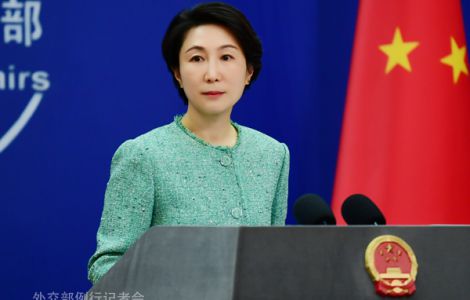中英对照:2024年1月8日外交部发言人毛宁主持例行记者会
Foreign Ministry Spokesperson Mao Ning’s Regular Press Conference on January 8, 2024
中新社记者6日,美国国务院发表美日韩“印太对话”联合声明,对中国在南海的主张及升级局势的行为表示关切,称将继续根据国际法开展三边海上安全和执法合作。三国重申台湾海峡的和平与稳定对国际社会的安全与繁荣不可或缺。请问中方对此有何评论?
China News Service The US State Department on January 6 released the Joint Statement on the Trilateral US-Japan-ROK Indo-Pacific Dialogue, expressing their concerns over China’s maritime claims in the South China Sea and escalatory behavior, and saying that they will continue their trilateral maritime security and law enforcement cooperation in accordance with international law. The three countries also reaffirmed the importance of peace and stability across the Taiwan Strait as indispensable to security and prosperity in the international community. What’s China’s comment?
毛宁中方注意到美日韩举行有关对话并发表共同文件,对其中的涉华不当内容表示严重关切。中方坚决反对有关国家以合作为名拼凑排他性“小圈子”,粗暴干涉中国内政,攻击抹黑中国,煽动对抗对立。
Mao Ning China noted the US-Japan-ROK dialogue and their joint statement. We express serious concerns about the statement’s rhetoric on China. We firmly oppose relevant countries’ attempt to cobble together exclusionary groupings in the name of cooperation, grossly interfere in China’s internal affairs, attack and smear China and stoke confrontation and antagonism.
当前南海局势总体稳定。中国始终坚定捍卫领土主权和海洋权益,同时致力于同有关当事国通过对话协商妥善处理分歧。个别域外国家在南海炫耀武力,挑动对抗,不利于南海和平稳定。
The situation in the South China Sea is generally stable. China is committed to safeguarding our own territorial sovereignty and maritime rights and interests, while properly managing differences with countries directly concerned through dialogue and consultation. Certain non-regional country has sought to flex muscles and incite confrontation in the South China Sea, which is not conducive to peace and stability in the region.
我要强调的是,台湾是中国领土不可分割的一部分,台湾问题纯属中国内政,不容任何外部势力干涉。维护台海和平稳定的关键在于坚持一个中国原则,坚决反对“台独”分裂。
I want to stress that Taiwan is an inalienable part of China’s territory and the Taiwan question is entirely China’s internal affairs that brooks no foreign interference. The key to keeping the Taiwan Strait peaceful and stable lies in upholding the one-China principle and firmly opposing separatist moves toward “Taiwan independence”.
亚太地区是和平发展的高地,不是大国博弈的棋局。我们敦促有关方面切实尊重地区国家维护和平稳定的努力,摒弃冷战思维,停止制造阵营对抗、加剧地区局势紧张。
The Asia-Pacific is a pacesetter of peace and development, not a chessboard for geopolitical contests. We urge relevant parties to earnestly respect regional countries’ effort for peace and stability, abandon the Cold War mentality, stop creating bloc confrontation and stop fueling tensions in the region.
路透社记者台湾地区官员称,上周日在台湾海峡上空发现的三只中方气球威胁航空安全。外交部能否保证飞越台湾海峡上空的中方气球不会威胁国际民航安全?
Reuters Taiwanese officials said three Chinese balloons detected flying over the Taiwan Strait on Sunday threatened aviation safety. Can the Foreign Ministry offer assurance that Chinese balloons flying over the Taiwan Strait are not a threat to international civil aviation?
毛宁我不掌握你提到的具体情况,这也不是外交问题。
Mao Ning I’m not aware of the specifics you mentioned and it’s not related to China’s foreign affairs.
总台央视记者美方不断收紧对华芯片出口管制措施,加大对中国半导体企业的打压力度。发言人对此有何评论?
CCTV The US has been tightening control over chip export to China and strengthening curbs on China’s semiconductor companies. Do you have any comment on this?
毛宁美方以所谓“国家安全”为由,不断加码对华芯片出口管制措施,无理打压中国半导体企业,是地地道道的经济霸凌行径。
Mao Ning The US has been stepping up control over chip export to China and going after China’s semiconductor industry in the name of national security. This is out-and-out economic bullying.
美国对华实施半导体出口管制措施,构成对中国的歧视性做法,违反《关贸总协定》第1条规定的最惠国待遇原则。美国以威胁网络信息安全为由将相关中国电信设备企业列入黑名单,禁止中国产电信设备进入美国市场,违反《关贸总协定》第11条规定的关于普遍取消数量限制的原则。同时,美方禁令也违反《技术性贸易壁垒协定》的相关规定。美方常常把“国际规则”挂在嘴边,但真正做的却是无视规则、破坏规则的事情。
The US semiconductor export controls against China amount to discriminatory practices that violate the most-favored-nation principle stipulated in Article 1 of the General Agreement on Tariffs and Trade (GATT). Blacklisting China’s telecom equipment companies and prohibiting Chinese-made telecom equipment from entering the US market in the name of protecting cyber security violate the principle of general elimination of quantitative restrictions stipulated in Article 11 of the GATT. The ban also contravenes stipulations in the Technical Barriers to Trade Agreement. Despite its rhetorical emphasis on international rules, the US habitually ignores and breaks existing rules.
注:为确保中英对照准确,“热词译”网站可能对中英文重新分段。

